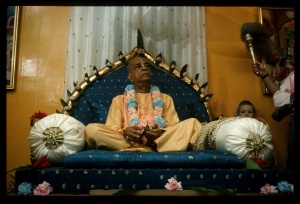760808 - Lecture SB 03.22.19 - Tehran

A.C. Bhaktivedanta Swami Prabhupada
Pradyumna: (chants synonyms, etc.)
- ato bhajiṣye samayena sādhvīṁ
- yāvat tejo bibhṛyād ātmano me
- ato dharmān pāramahaṁsya-mukhyān
- śukla-proktān bahu manye 'vihiṁsrān
- (SB 3.22.19)
Translation: (07:37) "Therefore I shall accept this chaste girl as my wife, on the condition that after she bears semina from my body, I shall accept the life of devotional service accepted by the most perfect human beings. That process was described by Lord Viṣṇu. It is free from envy."
Prabhupāda: Read the purport.
Pradyumna: Purport: "Kardama Muni expressed his desire for a very beautiful wife to Emperor Svāyambhuva, and he accepted his daughter for marriage. He was in the hermitage practicing complete celibacy as a brahmacārī, and although he had the desire to marry, he did not want to be a householder for the whole span of his life because he was conversant with the Vedic principles of human life. According to Vedic principles, the first part of life should be utilized in brahmācārya for the development of character and spiritual qualities. In the next part of life, one may accept a wife and beget children, but one should not beget children like cats and dogs.
"Kardama Muni desired to beget a child who would be a ray of the Supreme Personality of Godhead. One should beget a child who can perform the duties of Viṣṇu; otherwise there is no need to produce children. There are two kinds of children born of good fathers: one is educated in Kṛṣṇa consciousness so that he can be delivered from the clutches of māyā in that very life, and the other is a ray of the Supreme Personality of Godhead and teaches the world the ultimate goal of life. As will be described in later chapters, Kardama Muni begot such a child—Kapila, the incarnation of the Personality of Godhead, who enunciated the philosophy of Sāṅkhya. Great householders pray to God to send His representative so that there may be an auspicious movement in human society. This is one reason to beget a child. Another reason is that a highly enlightened parent can train a child in Kṛṣṇa consciousness so that the child will not have to come back again to this miserable world. Parents should see to it that the child born of them does not enter the womb of a mother again. Unless one can train a child for liberation in that life, there is no need to marry or produce children. (Prabhupāda coughing heavily throughout) If human society produces children like cats and dogs for the disturbance of social order, then the world becomes hellish, as it has in this age of Kali. In this age, neither parents nor their children are trained. Both are animalistic and simply eat, sleep, mate, defend and gratify their senses. This disorder in social life cannot bring peace to human society. Kardama Muni explains beforehand that he would not associate with the girl Devahūti for the whole duration of his life. He would simply associate with her until she had a child. In other words, sex life should be utilized only to produce a nice child, not for any other purpose. Human life is especially meant for complete devotion to the service of the Lord. That is the philosophy of Lord Caitanya.
"After fulfilling his responsibility to produce a nice child, one should take sannyāsa and engage in the perfectional paramahaṁsa stage. Paramahaṁsa refers to the most highly elevated perfectional stage of life. There are four stages within sannyāsa life, and paramahaṁsa is the highest order. The Śrīmad Bhāgavatam is called the Paramahaṁsa-saṁhitā, the treatise for the highest class of human beings. The paramahaṁsa is free from envy. In other stages, even in the householder stage of life, there is competition and envy, but since the activities of the human being in the paramahaṁsa stage are completely engaged in Kṛṣṇa consciousness, or devotional service, there is no scope for envy. In the same order as Kardama Muni, about one hundred years ago, Ṭhākura Bhaktivinoda also wanted to beget a child who could preach the philosophy and teaching of Lord Caitanya to the fullest extent. By his prayers to the Lord he had as his child Bhaktisiddhānta Sarasvatī Gosvāmī Mahārāja, who at the present moment is preaching the philosophy of Lord Caitanya throughout the world through his bona fide disciples."
Prabhupāda: So householder life is not condemned. It is required. If there is no householders, then wherefrom the saintly persons will come? They will not drop from the sky. So everything is required. In our Society we have got householder, we have got brahmacārī, we have got sannyāsī. Everything is required. So Kṛṣṇa consciousness movement is very scientific movement for the total benefit of the human society. If it is properly carried out, then everyone will be satisfied and happy and go back home, back to Godhead.
Thank you.
Devotees: Jaya. (end).
- 1976 - Lectures
- 1976 - Lectures and Conversations
- 1976 - Lectures, Conversations and Letters
- 1976-08 - Lectures, Conversations and Letters
- Lectures - Srimad-Bhagavatam
- SB Lectures - Canto 03
- Lectures - Asia
- Lectures - Asia, Iran - Tehran
- Lectures, Conversations and Letters - Asia
- Lectures, Conversations and Letters - Asia, Iran - Tehran
- 1976 - New Audio - Released in November 2013
- Audio Files 05.01 to 10.00 Minutes